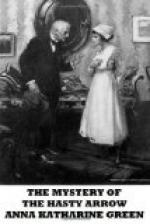His home! and these the surroundings amid which he had grown to manhood! Why should the sight of all this rouse emotions she believed eliminated by a treachery most cruel in face of promises most sacred? Why, as she looked about, and noted object after object which must have been there previous to his birth, did she see him as a child and boy and not as the man who had first won and then deserted her? She would not have had it so at this hour when strength was needed rather than tenderness. But she could not help her nature, or still the wild surging of her rebellious heart, as his portrait seen upon the wall challenged her constancy and whispered of the hour when his “forever” echoed her “forever” and the compact for eternity was sealed.
He had broken this compact—broken it soon—broken it before the honeymoon had passed. But she! Was she to show no firmer spirit whose love was of the soul and took no note of time? She was his wife, and acknowledged or unacknowledged, must yet prove to be his blessing though he—he——
But this would not do. The interview before her called for calmness. She would not add to the turbulence of her spirits by another glance at what brought back too much of the past to fortify her for the impending struggle. She had to do credit to his choice, to impress a difficult woman with her dignity as a wife. She must not shake nor weep.
Yet when she heard a step at the door, instinct told her to pull down her veil till the first greetings were over—a precaution for which she was deeply grateful when in another moment a young woman entered instead of her husband’s mother for whom she had asked and whom she naturally expected to see.
In the humiliation of the moment, her disappointment took words and she muttered within herself:
“A companion or possibly a relative. I am to be put off with kindly excuses; begged to state my errand—rehearse my claims and my hopes to some gentle go-between! I have not strength for that. I must see the mother—the mother. God give me wisdom and keep me calm—calm.”
Meanwhile the young woman she had instinctively called gentle advanced into the center of the room. Mechanically, Ermentrude rose to meet her, and thus stepped into a better light. Tragedy came with her. This it was impossible not to see—not to feel. But the warning which her aspect gave passed as she spoke and said in tones a little tremulous, perhaps, but with an air of perfect courtesy:
“I had hoped to see Mrs. Roberts herself.”
The smile with which this was greeted, the flush of pride and the joy of possession which lit the other’s pleasing features as she replied, “I am Mrs. Roberts,” should have carried the truth to Ermentrude.
But they did not. She looked surprised—baffled, and after the briefest hesitation, observed:
“I am a stranger in this city and have doubtless made some mistake. The Mrs. Roberts I have called to see—and I was told she lived here—is the mother of a gentleman of the name of——”




